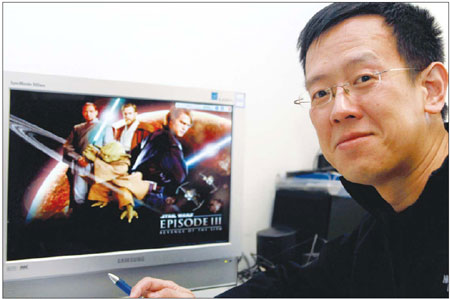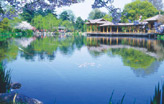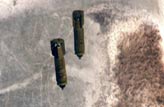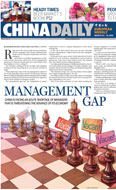The future is now
Updated: 2011-03-18 10:52
By Chitralekha Basu (China Daily European Weekly)
 |
|
Han Song embeds his thinking of China's future in his science |
The realities of the country’s rapid modernization are the stuff of fiction, and one sci-fi writer is chronicling their most dynamic dimensions
A writer in present-day China does not even have to make an effort to imagine the future, as any day-to-day record of urban China's dramatic transformations is futuristic in itself, Han Song says.
"To be a journalist in present-day China is like inhabiting a science fiction world," he explains.
Han, who wears several hats - those of a Xinhua journalist, blogger, science fiction writer and sci-fi historian - feels today's China lends itself to science fiction writing like never before, being "both a pre-industrial and a post-industrial culture".
While most mainstream literature today focuses on China's past, sci-fi looks into the future, he says. "And in China, the future is now."
He comes across as a self-effacing, mild-mannered guy who, given a choice, would love to spend all day burrowing into the mini mountain of sci-fi reads that keep accumulating on his desk.
The softness in his voice and deportment are quite at odds with Han's ruthless vision of the future in which the conflicts and confusions experienced in a fast-changing culture are not only exaggerated manifold but also fraught with a deep sense of foreboding.
Drawn to the dystopian world picture in novels by Isaac Asimov and Philip K. Dick since his school days in the early 1980s in Chongqing, the idea of the little human being's struggle to find oneself a space in an unsparing and mysterious world keeps returning in Han's work.
His maiden collection of short stories, Gravestone of the Universe (1998), featuring an astronaut who builds tombstones in memory of fellow explorers in space, was kept 10 years in waiting as prospective publishers found the pervasive tone of despair "too dark".
In Subway (2010), his latest book, a group of Chinese explorers, whose ancestors had been thrown out of the solar system when foreign powers took control of the Earth and sealed off the skies, return on a mission to their homeland to look for the remnants of Chinese people and culture. They land in the Beijing subway tunnel, which has been relegated to a graveyard, and find themselves on a train, rushing at breakneck speed to the point of no return.
The story is reflective, Han says, "of the human race, finding itself in an increasingly dark, endless, despairing environment, and there is no way out of this pervasive darkness".
The subway offers a mirage of a shelter as the train is heading toward "an unknowable, uncontrollable future", Han says.
It's a metaphor for modern urbanized China. He says: "Moving at high speed and never stopping it's an existentialist situation where people stand face to face and never know each other."
His conjectures about the future proved bone-chillingly prescient with the collapse of the World Trade Center in New York on Sept 11, 2001. He had come up with a similar, although more apocalyptic, vision of the seas rising to engulf and shatter the Manhattan skyline in 2066: Red Star Over America, published in 2000.
The book derives its name from Edgar Snow's account of the emergence of the Communist Party of China, Red Star Over China. In some ways, it takes the story forward, by imagining a large-scale terrorist attack, a body blow to the spirit of equality and fraternizing among nations.
Han had, in fact, used a similar motif of large-scale destruction in two other short stories.
"I often had a feeling that there would be a crisis in Western society, that it won't be able to sustain itself on its present set of values," he says.
His concern for the future of China in an increasingly mechanized, competitive and conflicted world remains an overriding one. A "staunch nationalist at heart", Han's anxiety that the Western model of development may not be the best for China runs through almost all that he writes.
"We want to be as powerful and as developed as the Western societies, but our ethos is different. Fast-track development does not agree with core Asian values," he says.
"Science, technology and modernization are not inherent in Chinese culture. They are like alien entities. If we buy into them, we turn ourselves into monsters, and that's the only way we can get along with Western notions of progress."
A chronicler of sci-fi writing in China, Han is excited by the freshness of ideas and, sometimes, the profundity of philosophical thought that his juniors in the business - Pan Haitian, who was born in the 1970s and Fei Dao, who was born in the 1980s - are bringing to the table.
He mentions a story by Fei Dao, in which Confucius returns to Mount Tai trying to unravel the mysteries of the future. The 5th century BC ideologue, whose ideas of society, government, filial duty and justice have long influenced Chinese culture, is depicted as still looking for answers at the end of the story. And his traditionally held beliefs are shaken during the process.
While the "science fiction writer" tag might sound "cool" and hip, sci-fi writing in China, Han insists, is still a marginal activity.
"Sci-fi is seen as unreal and inconsequential, as it is unable to solve real-life problems," he says.
And even as sci-fi magazines from Italy dedicate special editions to Chinese short stories and French publishers show interest in acquiring translation rights, "most people have no idea about science fiction in the present time", Han says.
"Readers in China are interested in reality, not in the relationship between human beings and nature," he says.
Han's Declarations of Imagination - evidently, he likes playing on existing titles while naming his books, this time borrowing it from the surrealist painter Salvador Dali - was written with the idea of spreading greater awareness about sci-fi writing in China.
There are only about 20 authors seriously pursuing this genre, and about two magazines - the Chengdu-based Science Fiction World and Taiyuan-based New Science Fiction - dedicated to publishing what is still seen by a huge section of readers as stories "meant for children".
"But these people have great imagination," Han says. "They care about China's future and its people, and their hopes and aspirations. I wanted to record the achievements of these writers and connect them to circles in which they are not so well-known."
Perhaps the edge sci-fi writers have over novelists of social realism is that they do not need to rein in their imagination.
"They can put the country in (hypothetically) extreme situations to see how people might respond. They can put China to test the way no serious writer can," Han says.
And China's sci-fi writers have wonderful material to work with at this time.
"The future looks more colorful and positive than ever, and more open to the spirit of discovery," Han says.
A society that's vivid, flourishing and modernizing at an accelerated pace creates a happy hunting ground for potential sci-fi writers.
Maybe, one day, people will accept reading about state-of-the-art technology and contemporary politics in the same novel, Han says.
"Living in the times that we do, we cannot help but become interested in technology. When that happens, science fiction will indeed become mainstream."
Yang Guang contributed to this story.
E-paper

City of Joy
Welcome to the 'world of smiles' where life meanders slowly.
Preview of the coming issue
Debate on nuclear power revived
The future is now
Specials

Ping-pong Hotel
A ping-pong racket-shaped architecture is planned in East China.

Blasting away floating ice
Bombs are dropped over a section of the Yellow River to blast floating ice.

Beloved polar bear died
Berlin's beloved polar bear Knut, an international star died Saturday.
